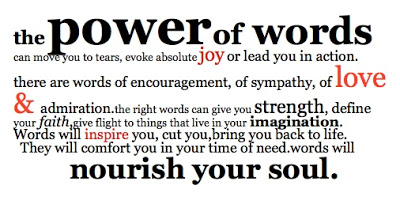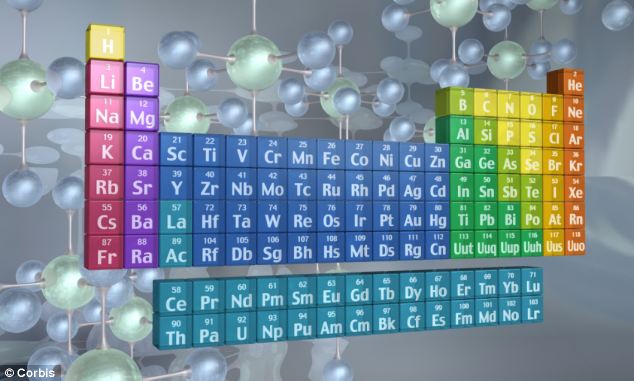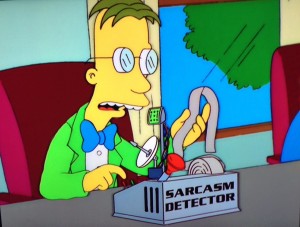Grammar Police Undercover: Pet Peeves At The Donut Shop
 I’ve admitted it before: I love words, and, conversely, it causes me physical discomfort (and even agitation) when simple grammatical phrases are misused, abused, and generally disrespected by the very professionals who are (ostensibly) supposed to treat them kindly.
I’ve admitted it before: I love words, and, conversely, it causes me physical discomfort (and even agitation) when simple grammatical phrases are misused, abused, and generally disrespected by the very professionals who are (ostensibly) supposed to treat them kindly.
 One of the more popular commercials that aired for the Super Bowl this year was notable for one reason only: it featured the salaciously sultry, perennially pouty, gregariously gorgeous Scarlett Johansson. Now I do not fault the advertisers for whatever product they were hawking (funny how utilizing particularly ambrosial spokespersons can leave a consumer unaware of the product). I do happen to remember what product dishy Scarlett was pushing (soda maker), but only because of the (arguably) egregious misuse of common grammar by the advertisement’s writers:
One of the more popular commercials that aired for the Super Bowl this year was notable for one reason only: it featured the salaciously sultry, perennially pouty, gregariously gorgeous Scarlett Johansson. Now I do not fault the advertisers for whatever product they were hawking (funny how utilizing particularly ambrosial spokespersons can leave a consumer unaware of the product). I do happen to remember what product dishy Scarlett was pushing (soda maker), but only because of the (arguably) egregious misuse of common grammar by the advertisement’s writers:
Scarlett: “less sugar, less bottles.”
Ouch. Though I was still not able to tear my gaze from those delectable lips on that lucky straw, my grammar hackles stood straight up and I was tempted to call 811 (emergency line straight to the undercover grammar police). I did not, however, call in the offense, but only out of respect for Ms. Johansson (who could not be blamed for the wordsmiths who created the script for the 4-million dollar ad spot).

Ahem.
The faux pas did prompt me to write my first grammar blog of 2014. Hey, it’s already almost mid-February. I am normally (self-) called to action much earlier in the new year. Maybe after reading this post, you’ll think I am too touchy; that I am being picky. But perhaps you, too, cringe when the English language (yes, our American, allegedly-bastardized version) is trampled upon.
So without further commentary, let’s dive headlong into the raw facts:
It’s “less” when it refers to a more intangible (uncountable) substance or collection.
Less love. Less discrimination. Less misuse of the English language.
It’s “fewer” when we’re discussing something that can be counted individually. Like bottles.
Fewer donuts. Fewer drunken sailors. Fewer cats being juggled.
And of course, one misuse got to me thinking about more, semi-common, slaughterhouse grammar:
Interest is piqued; it is not peaked. Technically, interest can peak—as in “reach a maximum”–but it cannot be peaked. And it is never, EVER peeked. Easiest way to remember?
“The description of the mountain peak really piqued my interest, and I took a peek.”
Many expressions become so misused that they actually reach that critical mass where the incorrect version is more common than the correct, and our culture begins a process I believe began in the late twentieth century (and abhors me as a linguist): gradually “accepting” an incorrect term simply because of its mass proliferation. It’s happening more and more these days, this “giving in” to the collectively incorrect.
In other words: correctness by numbers.
An example?
I could care less.
I hear this version much more often than the correct usage: I could NOT care less.
Think about the translation of the first. It literally means “I am capable of caring less than I do currently.” Now if that were the meaning the speaker sought, there would be nothing grammatically incorrect. But 99% (if not 100%) of the time, the speaker means to say “I am not capable of caring less about this subject.” In other words, the speaker has reached rock bottom, and is done with whatever it is they reference.
But the incorrect usage is slowly seeping into “acceptable speech”.
 I say we don’t bend. Ever. I know, it sounds like your high school English teacher—no flexibility whatsoever. But think about it. Did your Chemistry teacher attempt to change particular abbreviations in the Periodic Table of Elements? Did your Physics teacher advocate the selective deconstruction of the physical laws and forces of our universe?
I say we don’t bend. Ever. I know, it sounds like your high school English teacher—no flexibility whatsoever. But think about it. Did your Chemistry teacher attempt to change particular abbreviations in the Periodic Table of Elements? Did your Physics teacher advocate the selective deconstruction of the physical laws and forces of our universe?
Why, then, it is considered acceptable to snap whatever law of grammar we wish, simply because a majority of (lazy, anarchist, agnostic, moronic, complacent, pick your adjective) people butcher it? I say it’s not okay.
Affect is primarily a verb. Effect is primarily a noun.
(You affect my grammatical sensibilities enough to have the effect of pissing me off.)
You are supposed to know that the correct term is used to; you are not suppose to think it’s use to.
If you didn’t devote less time to grammar than to Physics, then you would know the difference in the aforementioned words.
Lying is bad, unless it is to lie down (you lay down an object, like a gun—or your book on grammar).
You accept a gift; except when you are grammatically incorrect (or ungrateful).
Your football team loses the big game because your ball-carriers had loose grips, and fumbled too much.
There are, of course, myriad examples of other even more common errors (their, they’re, there; to, too, two; you’re, your; sit, set). It may seem petty to people, but when you write for a living (or even simply for pleasure), and you expect people to read what you’ve composed, it should not (seem petty, that is). Your words—moreover, your usage of words—defines you.
Don’t be someone who could not care less about their grammar. Lie down, think about the things, as a writer, you are supposed to be thinking about. Accept constructive criticism, except when you know it to be incorrect.

Be one of the protectors of the written word: affect those who would change meanings on a whim, causing an ultimately negative effect on our language.
‘Nuff said. I don’t want you to loose your concentration, lay down in frustration, thinking “their just trying to confuse me”, or, worse, get to the point where you could care less. I realize they’re are probably many of you who’ve already set down, to tired to go on, effected more negatively then the time you’re grandma put curry instead of cumin into the family pumpkin pie.
S’okay. Fret not. There’s still time to jump on the bandwagon and bring home the big win. You can still do your part.
Be a proponent.
Be firm.
Be correct.
Or don’t. After all, its a free country.
~~~~~~~~~~~~~~~~~~~~~~~~~~~~~~~~~~
The blank page is dead…long live the blank page.
~~~~~~~~~~~~~~~~~~~~~~~~~~~~~~~~~~
 Author known to use spontaneous satire, sarcasm, and unannounced injections of pith or witticisms which may not be suitable for humorless or otherwise jest-challenged individuals. (Witticisms not guaranteed to be witty, funny, comical, hilarious, clever, scintillating, whimsical, wise, endearing, keen, savvy, sagacious, penetrating, fanciful, or otherwise enjoyable. The Surgeon General has determined through laboratory testing that sarcasm can be dangerous, even in small amounts, and should not be ingested by those who are serious, somber, pensive, weighty, funereal, unsmiling, poker-faced, sober, or pregnant.) For those who enjoy and/or revel in the utterance of profanity, the author reserves the right to substitute “fish” for “fuck” without fear of repercussion, mental reservation, or purpose of evasion.
Author known to use spontaneous satire, sarcasm, and unannounced injections of pith or witticisms which may not be suitable for humorless or otherwise jest-challenged individuals. (Witticisms not guaranteed to be witty, funny, comical, hilarious, clever, scintillating, whimsical, wise, endearing, keen, savvy, sagacious, penetrating, fanciful, or otherwise enjoyable. The Surgeon General has determined through laboratory testing that sarcasm can be dangerous, even in small amounts, and should not be ingested by those who are serious, somber, pensive, weighty, funereal, unsmiling, poker-faced, sober, or pregnant.) For those who enjoy and/or revel in the utterance of profanity, the author reserves the right to substitute “fish” for “fuck” without fear of repercussion, mental reservation, or purpose of evasion.




For all intensive purposes, this is the best write up I’ve seen on this subject. You have really effected me. Supposably, I don’t do this to much, but irregardless I’m gonna be working hard to make sure I don’t do this anymore. 😉
Nice. My kind of reply. 😀
(I almost included irregardless.)
Good one, Rob.
Like you, there was a time when I became physically angry and upset by the misuses you so aptly illustrated. Now I merely shake my head and remember for the umpteenth time that part of growing up and growing wiser is seeing the world grow smaller around you and realizing that people are not as intelligent as many would believe, particularly those who are in charge of things such as government and entertainment.
I would like to add an additional error I hear constantly that does still drive me up the wall: “Anyways.” THIS IS NOT A WORD!
It’s “anyway”.
How hard is that?
How effing lazy and stupid and lemmingish have we become???!!!
See? My blood pressure just shot up forty points. Why don’t we have an emoticon equivalent of the F-word?
The REALLY, REALLY REEAALLYY sad part is that when I looked up both forms just now in my Google Dictionary plug-in, “anyways” is, in fact, listed as an informal or dialectical variation of “anyway”.
But then again, “doh” was added to the OED back in the 90s after Homer Simpson ingrained it into our culture. I checked the GooDicPlug and “doh” is there, as well.
We are doomed.
Thank you for writing this. Perhaps it will help a few (let’s make that a gazillion) people to write and speak better.
But who are we kidding? This is a losing battle and we all know it. Us writers will go down with the ship, of course, as we see utterly stupid and inane and nonsensical evolution, revolution, and shifts in culture and in the ever-malleable thing that is language. Language is more fluid than chemistry or physics or mathematics. Sucks for us.
Long live the Queen. And her English… language, that is.
I did find an animated GIF of the Hulk giving the bird but it won’t translate here. So use your imagination. 🙂
I used my imagination, but all I could come up with was Spiderman dropping trou and flashing a moon.
“Anyways” was another on my list. And you’re right; the hackles always stay hidden—I never say anything (unless it’s a writer friend and I know they would want to know/be corrected. But when I see “dictionaries” begin to add these incorrect usages simply because a lot of people are abusing a word or phrase, that’s when the hackles become fangs and claws. 😉
Oh, yes. They call it “informal” first. Then it eventually reaches “widely-accepted”. Pretty soon it’s “either are correct”.
It’s all a lemming conspiracy, don’t you know? POWER TO THE SHEEPLE!
Grrr.
I heard that cops gather at the “donut” shop and that the grammar police gather at the “doughnut” shop. True?
I believe you are raised a salient point, Jack. Mea culpa. 😀
Thank you so much for this post! Irregardless is in my top ten along with alright. Both are gaining traction, which makes me want to throw a tantrum.
Ignorance of correct grammar is (somewhat) forgivable, but amending the dictionary because the scales have tipped in favor of the percentage misuse? Just… no.
I agree, Sarah. No one’s perfect, and the occasional slip (whether typo or simply ignorance) is not a big deal (hey, editors need work too!). 🙂 But the trend of intellectual culture accepting bastardization of proper grammar is akin to a sin (no rhyming intended, but it was kind of nice). My fear is that it’s only going to be getting worse. Such trends usually do continue, because at their core is a lemming-esque approach. Power to the sheeple.
Thanks much for the comment (and more food for thought). 😀
Well said, sir, However–“a process I believe began in the late twentieth century (and abhors me as a linguist)” – ummm… can a process abhor you? Appal, perhaps?
Thanks, Sue! Hmm, I guess since to abhor = to be disgusted = to be appalled, certainly a process can can cause a person to be abhorred—but I agree, in the order used, it sounds a bit like the process is doing the abhorring. I’d argue that it isn’t technically incorrect, but if I let my editor work on my blog, I definitely would have changed it up on that suggestion. (For the record, though, I am pretty sure it’s “appall” with two l’s—damn those typos!) 😉
I’m afraid I agree with Sue. It IS technically incorrect. What you wrote DID imply that the process abhorred you. Perhaps that’s not what you meant, but unless you are Humpty Dumpty, words will do that to you.
If you abhor the process, why not say so?
If you read my response, I agreed too. In context. By definition, we’ll have to agree to disagree. 🙂
And for the record (not said in that abhorrent way, BTW) 🙂 I have never claimed perfection. Nowhere near so!
Yet no agreement on my comment of appal versus appall. Doth I sense an atmosphere of skewer the blogger? Juuust kidding, Bernard. You know I love and respect you. And Sue.
Rob, the only thing more impressive than your grasp of grammar is your ability to focus on anything other than Scarlett Johansson’s lips. While I did not watch the Super Bowl (yes, I was the one), I don’t think I would have noticed anything other than her mouth during that commercial.
One thing, though, about “I could care less.” While I agree that the current usage is unthinking most of the time, I did, a long time ago, read somewhere that the phrase is actually ironic or sarcastic — as in “When I say ‘I could care less,’ I actually mean the opposite.” That being said, I don’t think that most people who throw the phrase out are actually thinking that. Or anything, for that matter.
Couldn’t agree more re: SJ. Your logic on the possible sarcastic use is quite sound, yet I believe it is like the Yeti/Bigfoot: theory might suggest it’s out there, but I feel comfortable saying an example will never be found. 😉
In all seriousness, after your comment, I paid (even closer) attention to uses of “I could care less” (it is, by far, the most common on the list of egregious faux pas language battering); I firmly believe no one out there means it any other way than the one we know they do.
Again, perfectly logical in theory. I believe totally unprovable in practical use. 🙂
Thanks for the thought-provoking comment, Scott. (And I never would have guessed you were the one!)
I can’t handle the car advertisement where they drive “further.” I’m convinced they go “farther.” Advertising copywriters may have great ideas, but words are strange and foreign to them.
I would suggest advertisers (most, anyway) have absolutely NO great ideas. We find ourselves nearly every night asking aloud “someone paid good money for THAT?”. And I’m not even talking about the Hyundai commercial for their hybrid that produces no emissions, where the man tries (unsuccessfully) to commit suicide by CO2 inhalation in a closed garage. Yes, that’s an actual commercial, aired only, I believe, in Europe. Wow. How about the Old Spice “Smellcome to Manhood” campaign? I try to imagine pitching that commercial to a boardroom full of deep-pocket advertisers. I cannot dream up any scenario where I’m not asked to be escorted out by Security. And I write fiction. 🙂
I peek at my interest. Finding less, I am ever more depressed.
Rob, I am so glad there are still people bothered by the misuse of language.
I’ve been reading college papers (English Lit ) and am astonished that the profs are giving excellent marks. I would struggle to give a “C” for a paper a 13 year old should be able to compose.
Angst away…
I find Interest is so shy that many times the only way to catch even a glimpse is to peek. I am sure my feelings of angst, seeing more and more (rather than fewer and fewer) undeserved As on mediocre papers, would lessen my confidence in our underlying educational system.
It does create hope, however, that there are still those who could not care MORE about the quality of the papers and the minds of the students who create them!
Soldier on! 😀